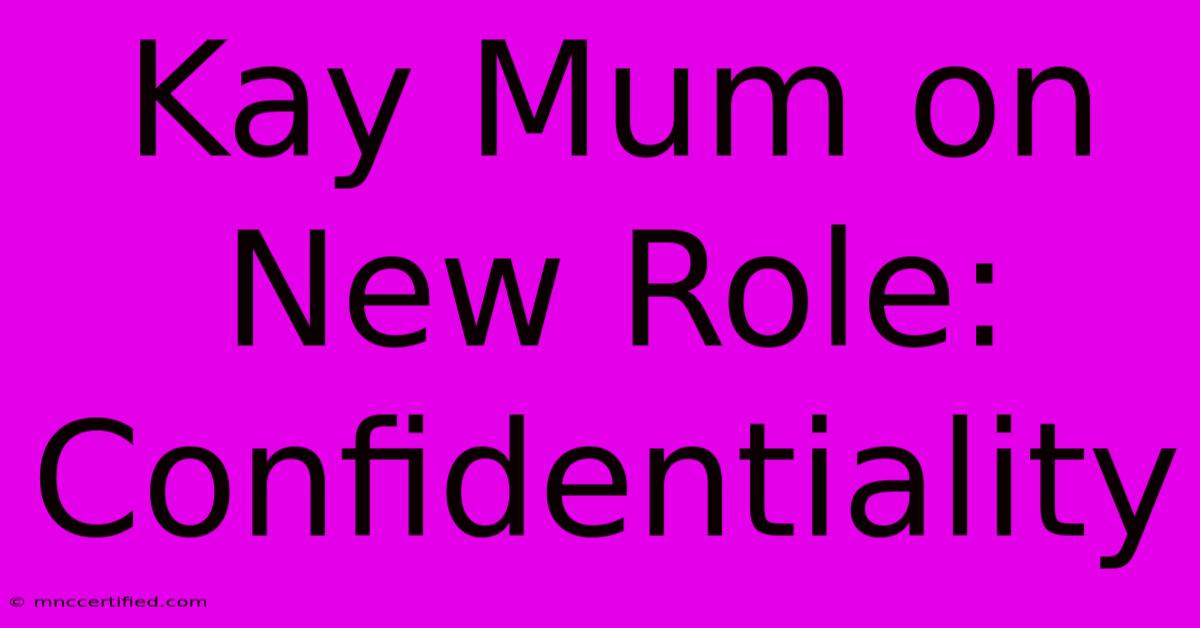Kay Mum On New Role: Confidentiality

Table of Contents
Kay Mum on New Role: Confidentiality and the Challenges Ahead
Kay Mum's appointment to her new role has been met with excitement and anticipation, but also a significant focus on the confidentiality she will be expected to maintain. This article explores the complexities of her new position, the importance of discretion, and the potential challenges she may face navigating this sensitive landscape.
The Importance of Confidentiality in Kay Mum's New Role
Kay Mum's new role, while undisclosed to protect her privacy and maintain confidentiality, undoubtedly involves handling sensitive information. Whether in a corporate, governmental, or non-profit setting, maintaining confidentiality is paramount. Breaches can have severe consequences, including legal repercussions, reputational damage, and financial losses. This underscores the immense pressure and responsibility that accompany her appointment.
Types of Confidential Information Kay Mum Might Handle
Depending on the nature of her new position, Kay Mum might encounter various forms of confidential information. This could include:
- Financial data: Budgets, investments, financial performance, and client financial information.
- Personal data: Employee records, customer information, and sensitive health or personal details.
- Strategic information: Business plans, marketing strategies, upcoming product launches, and intellectual property.
- Legal documents: Contracts, agreements, and internal legal communications.
Each type demands a different level of protection and adherence to specific regulations like GDPR (General Data Protection Regulation) or HIPAA (Health Insurance Portability and Accountability Act), depending on the industry.
The Challenges of Maintaining Confidentiality
While the importance of confidentiality is clear, maintaining it presents several challenges:
1. Human Error:
Accidental disclosure through misplaced documents, unintentional email forwarding, or even casual conversations poses a significant risk. Even the most conscientious individuals can make mistakes. Robust security protocols and regular training are vital to mitigate this risk.
2. Technological Threats:
Cybersecurity threats such as hacking, data breaches, and malware attacks are ever-present. Strong cybersecurity measures, including firewalls, encryption, and regular software updates, are crucial in protecting confidential information.
3. Internal Threats:
Malicious insiders or disgruntled employees can pose a considerable threat. Strong background checks, access controls, and internal audits can help mitigate this risk.
4. External Pressures:
Kay Mum may face external pressures to disclose confidential information, perhaps through media inquiries, legal subpoenas, or even blackmail attempts. Navigating these situations requires strong ethical principles and a clear understanding of legal obligations.
Strategies for Success: Confidentiality Best Practices
To successfully navigate these challenges, Kay Mum and others in similar positions should adopt these strategies:
- Clear Policies and Procedures: Having well-defined confidentiality policies and procedures in place is essential. These should be clearly communicated and regularly reviewed.
- Secure Data Storage and Access: Implementing robust data storage and access controls, including encryption and multi-factor authentication, is critical.
- Regular Training and Awareness: Regular training on data protection, cybersecurity, and ethical conduct is essential to keep employees informed and vigilant.
- Incident Response Plan: A well-defined incident response plan should be in place to address any data breaches or security incidents promptly and effectively.
- Legal Counsel: Consulting with legal counsel to understand legal obligations and best practices concerning confidentiality is crucial.
Conclusion: The Ongoing Importance of Confidentiality
Kay Mum's new role highlights the ongoing importance of confidentiality across various sectors. By implementing robust strategies and adhering to best practices, she can successfully navigate the challenges and fulfill her responsibilities with integrity and professionalism. The success of her new endeavor will, in part, hinge on her ability to maintain confidentiality effectively. This commitment to discretion will undoubtedly contribute to the trust and success of her new role.

Thank you for visiting our website wich cover about Kay Mum On New Role: Confidentiality. We hope the information provided has been useful to you. Feel free to contact us if you have any questions or need further assistance. See you next time and dont miss to bookmark.
Featured Posts
-
Bayern Rout Augsburg 3 0 Match Review
Nov 23, 2024
-
East Enders Alum Returns To Soaps
Nov 23, 2024
-
Composite Bonding Turkey Prices
Nov 23, 2024
-
Federal Trophy Bonded Bear Claw
Nov 23, 2024
-
Dogeverse Price Prediction 2025
Nov 23, 2024